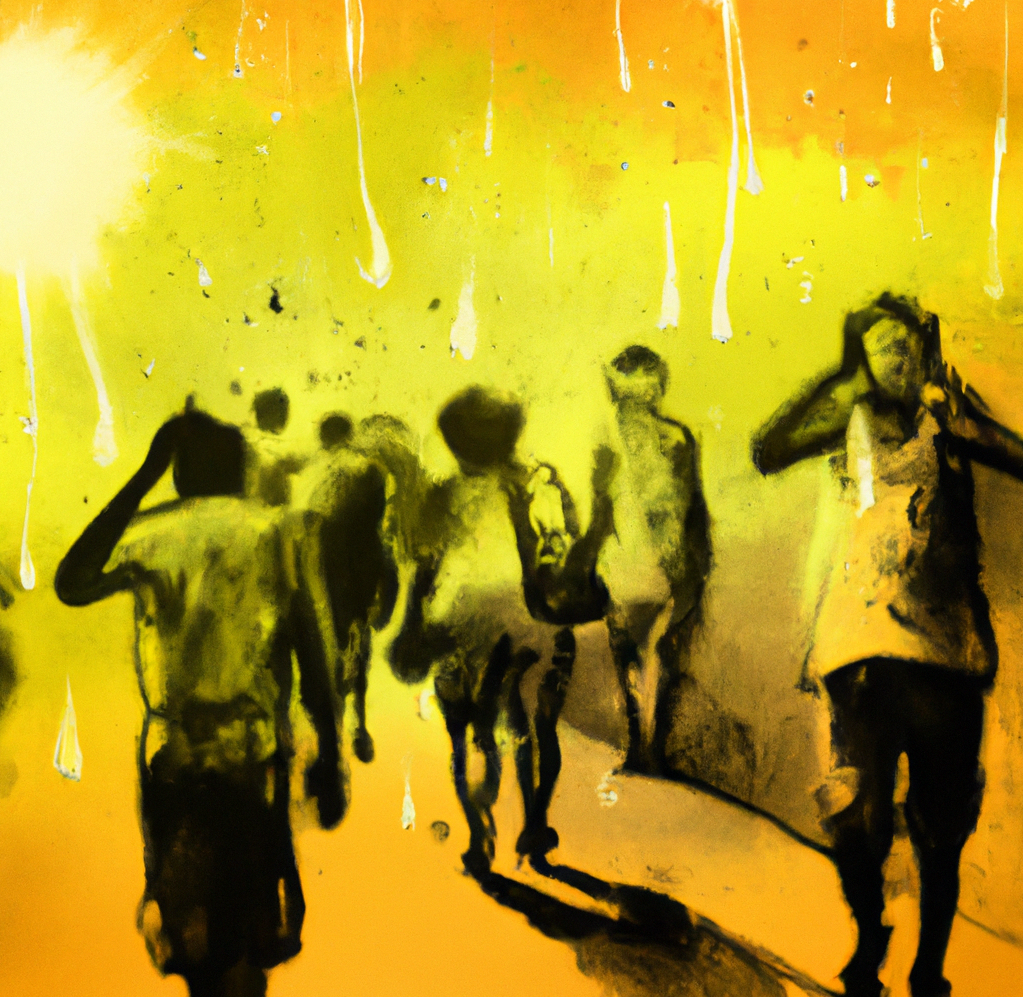The sun,
a fiery iron
brands the sky
as sweat flows
like melting wax,
across the parched
and cracking earth.
A blanket of fumes
trapping the heat
shimmers on the horizon –
summer’s wrath.
Peaks of simmering swelter,
with nowhere to run
bodies stressed
and stranded –
casualties
of exhausting,
manic lives.
This poem is inspired by recent research, which has found that heatwaves are becoming more frequent and more deadly.
Heat waves are periods of abnormally hot weather that last for days or weeks. They are one of the most direct effects of climate change that people experience. As global temperatures rise due to increased greenhouse gases in the atmosphere, heat waves are becoming more frequent, intense and, longer-lasting. The trapped heat energy causes more very hot days and warm nights year-round. However, the impacts are felt most dramatically during peak summer months. Extreme heat events put stress on the body and can cause heat-related illnesses and deaths, especially in vulnerable populations.
In this new study, researchers wanted to understand how the frequency and severity of extremely hot summers will change in the future. They looked at data on heat deaths across 47 countries, combining this information with climate model data to see how often past very deadly hot seasons might occur in future climates. They found that extreme hot seasons that used to happen every 100 years now happen every 10-20 years on average, and that these extreme seasons will happen even more often if we do not adapt to and mitigate against the climate crisis. This shows we urgently need to reduce climate change and help people adapt to hotter conditions, as acting now will reduce impacts on human lives in the future.

My poem is also based on the logic of scientific investigation. It provides a logical and non-offending alternative to the Georgist proposal for eliminating poverty and making our nation a more socially just place, by introducing a single tax on land values. Unlike your previous poem about the heat, it has both rhyme and meter in its composition.
A MORE STEALTHY GEORGIST CAT
The Georgist cat is small and lean
And often doesn’t get to be seen.
It hides in the branches of an economic’s-tree
So it takes a long while for you or for me,
To appreciate its cute and original form
That the landlords are so ready to scorn.
The economic’s-tree has many fine branches
(On which we contend, there are no free-lunches).
Whilst the land-owning rich in the city all claim
As bloated capitalists, that they’re not to blame
For the gap that lays ‘twixt the poor and the wealthy,
But oppose any tax to make our nation healthy.
Have you heard the tale of a committee, that
Thought to bell and get warning of a fat cat?
But could not find a soul to apply this device,
Because typically all were a council of mice!
Our Georgist cat has a bell ready-fitted,
(Which makes this analogy more to be pitted).
This warning sound makes our ideals unwanted,
For a new tax is how politicians get doubted.
So the Georgist cat fails to catch any mice
That pose as landlords, along with their vice.
But how shall we silence the bell’s warning sound
And quieten the news that our pussy’s around?
Our Georgist feline is in serious error,
‘Cause its bell draws attention not only to whether
Valuable sites can be ethically shared,
But also the rent from a site is declared
As the means to replace other kinds of taxation,
Which obviously causes the landlords vexation.
In the economic’s tree many other beasts lurk
But are missed, after learning of Henry G’s quirk
Through the cat-finder’s recently brilliant discovery.
This writer seeks a new means for recovery
From our politi-unacceptable claim,
And stealthily project LVT once again.
If we would but examine some more of the tree
Alternatives are waiting there for us to see.
Among them is hiding a far better way
For an equivalent LVT effect, to stay
In essence, without causing such evil offences
To the landlords and their partitioning fences.
When a property-owner decides to sell–quick
The gov’ment buys its land, and not the public!
Its occupant then leases it for a similar fee
To the One-Tax of Henry George’s decree.
Any buildings on-site should be sold as previously
But without the land, on which the price grievously
Had risen, with huge speculation in its advance
That stopped entrepreneurs from having a chance.
The cost of this land must be raised through new bonds
Which the government sells and the public responds,
‘Though their interest-rate’s a bit lower than rent,
Their returns are more stable than the average tenant!
This process will take many years to complete–
So its financial support is no great money feat.
After the lease-fees begin to collect,
Gov’ments can tax less, and firmly expect
To pursue this policy without change, until
All the lease-fees are site-rents in the Gov’ment’s till.
With the land properly shared, the government sees
That site development stays with the current leasees.
Other taxes that cause so much trouble and hate
Are scrapped, with great pleasure to all in the state,
Except for some bankers and the tax collectors
Whose actions no longer apply in these sectors.
Land-rights will be shared through this simple device,
By a fast-growing country that takes our advice.